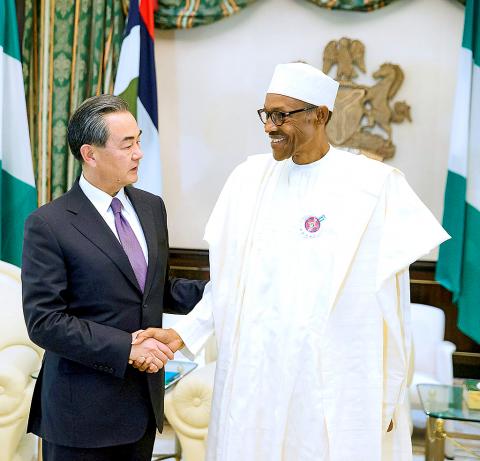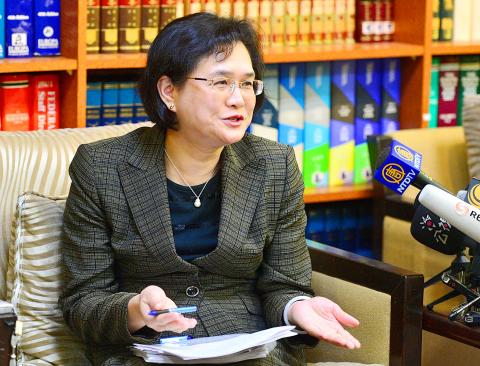The Ministry of Foreign Affairs yesterday said Nigeria has decided to play along with a Chinese “peremptory political scheme,” after the west African country announced that it would no longer recognize Taiwan as a nation and would cease all diplomatic relations in accordance with the “one China” principle.
The ministry in a news release accused Nigeria of seeking to confuse the international community by declaring that it would honor the “one China” principle and sever diplomatic relations with Taipei, as the two nations have never established formal diplomatic ties.
“The ministry strongly protests and deplores the Nigerian government’s cooperation with China to carry out a politically motivated, unreasonable, peremptory and brutal scheme,” it said.

Photo: Reuters
The strongly worded statement followed a joint news conference by Nigerian Minister of Foreign Affairs Geoffrey Onyeama and visiting Chinese Minister of Foreign Affairs Wang Yi (王毅) in Abuja on Wednesday, at which they said that Taipei’s office in the capital would be shut down and moved to Lagos, Nigeria.
“Taiwan will not have any diplomatic representation in Nigeria and also they will be moving to Lagos, to the extent that they function as a trade mission with a skeletal staff,” the state-run News Agency of Nigeria quoted Onyeama as saying.
Nigerian officials and organizations have also been banned from having official exchanges with Taiwan.

Photo: Wang Yi-sung, Taipei Times
At a news conference in Taipei yesterday morning, ministry spokeswoman Eleanor Wang (王珮玲) urged Nigeria to leave room for follow-up negotiations.
“In an effort to promote a substantial trade relationship, Taiwan and Nigeria inked a memorandum of understanding on mutually establishing trade missions on Nov. 21, 1990,” she said.
In 1991, Taiwan established a trade mission in the then-Nigerian capital, Lagos, before moving it to its new capital, Abuja, after reaching a consensus with the Nigerian Ministry of Foreign Affairs in August 2001, Eleanor Wang said, adding that since then China has been pressuring Nigeria to relocate Taipei’s office back to Lagos.
Beijing has stepped up efforts to suppress Taipei in the international arena as part of punitive measures over President Tsai Ing-wen’s (蔡英文) refusal to acknowledge the so-called “1992 consensus.”
The “1992 consensus” refers to a tacit understanding between the Chinese Nationalist Party (KMT) and the Chinese Communist Party that both sides of the Taiwan Strait acknowledge that there is “one China,” with each side having its own interpretation of what “China” means. Former Mainland Affairs Council chairman Su Chi (蘇起) in 2006 admitted to making up the term in 2000.
Later yesterday, Democratic Progressive Party Legislator Tsai Shih-ying (蔡適應) said that China’s nonsensical tactics were not conducive to improving cross-strait ties and were beneath the great power Beijing claims to be.
The lawmaker went on to ridicule Nigeria’s announcement, saying: “I did not know you could break up with someone without even being in a relationship with them in the first place.”
An internal Nigerian government document detailing the decision had been available since last week, Tsai Shih-ying said, calling on the Ministry of Foreign Affairs to step up its efforts to safeguard Taiwan’s international status.
Separately yesterday, in Guatemala, Presidential Office spokesman Alex Huang (黃重諺), who is accompanying the president on her ongoing visit to Central America, said China’s pressuring of Taiwan would only raise hackles.
Beijing’s return to its old track — the use of pressure or intimidation — would only antagonize Taiwanese and would not be favorable to the development of cross-strait relations, he added.
“The existence of the Republic of China is an indisputable fact. Applying pressure and intimidation will not change that fact,” Huang said.
Additional reporting by CNA

A Ministry of Foreign Affairs official yesterday said that a delegation that visited China for an APEC meeting did not receive any kind of treatment that downgraded Taiwan’s sovereignty. Department of International Organizations Director-General Jonathan Sun (孫儉元) said that he and a group of ministry officials visited Shenzhen, China, to attend the APEC Informal Senior Officials’ Meeting last month. The trip went “smoothly and safely” for all Taiwanese delegates, as the Chinese side arranged the trip in accordance with long-standing practices, Sun said at the ministry’s weekly briefing. The Taiwanese group did not encounter any political suppression, he said. Sun made the remarks when

The Taiwanese passport ranked 33rd in a global listing of passports by convenience this month, rising three places from last month’s ranking, but matching its position in January last year. The Henley Passport Index, an international ranking of passports by the number of designations its holder can travel to without a visa, showed that the Taiwan passport enables holders to travel to 139 countries and territories without a visa. Singapore’s passport was ranked the most powerful with visa-free access to 192 destinations out of 227, according to the index published on Tuesday by UK-based migration investment consultancy firm Henley and Partners. Japan’s and

BROAD AGREEMENT: The two are nearing a trade deal to reduce Taiwan’s tariff to 15% and a commitment for TSMC to build five more fabs, a ‘New York Times’ report said Taiwan and the US have reached a broad consensus on a trade deal, the Executive Yuan’s Office of Trade Negotiations said yesterday, after a report said that Washington is set to reduce Taiwan’s tariff rate to 15 percent. The New York Times on Monday reported that the two nations are nearing a trade deal to reduce Taiwan’s tariff rate to 15 percent and commit Taiwan Semiconductor Manufacturing Co (TSMC, 台積電) to building at least five more facilities in the US. “The agreement, which has been under negotiation for months, is being legally scrubbed and could be announced this month,” the paper said,

Japan and the Philippines yesterday signed a defense pact that would allow the tax-free provision of ammunition, fuel, food and other necessities when their forces stage joint training to boost deterrence against China’s growing aggression in the region and to bolster their preparation for natural disasters. Japan has faced increasing political, trade and security tensions with China, which was angered by Japanese Prime Minister Sanae Takaichi’s remark that a Chinese attack on Taiwan would be a survival-threatening situation for Japan, triggering a military response. Japan and the Philippines have also had separate territorial conflicts with Beijing in the East and South China